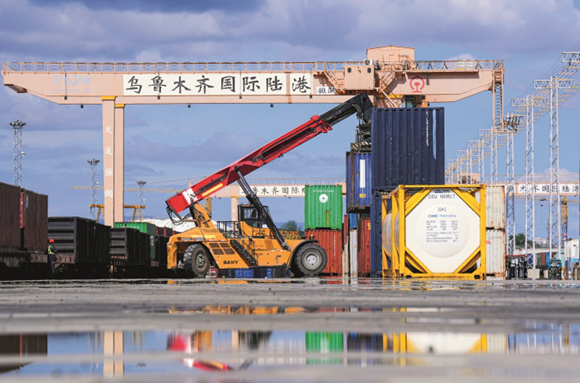
 0 Comment(s)
0 Comment(s) Print
Print E-mail ChinAfrica, August 30, 2024
E-mail ChinAfrica, August 30, 2024

A worker examines an electric car at an automobile assembly plant in Wuhan, in China's Hubei Province on April 1. [Photo/Xinhua]
The China-Africa Think Tanks Forum (CATTF) has again demonstrated that think tank forums and conferences play a crucial role in facilitating people-to-people exchanges and dialogues, sharing insights, and fostering collaboration. In fact, the CATTF continues to provide a valuable platform for scholars, policy-makers, academics, journalists and experts from China and Africa to broaden discussions on key issues, exchange ideas and explore avenues for cooperation.
The 13th meeting of the CATTF continued to build on its proud track record in contributing significantly to the consolidation and promotion of enhanced China-Africa friendship. This was effectively demonstrated by the joint release of the Africa-China Dar es Salaam Consensus, also referred to as the Consensus Among African and Chinese Think Tanks on Deepening Global Development Cooperation. This commendable document represents a significant strategic initiative by Chinese and African scholars to deepen mutual learning.
The Consensus, which in essence represents the collective voice of the Global South, calls on the international community to deepen development cooperation based on the principles of mutual respect, solidarity, win-win cooperation, openness, and common prosperity. It also focuses on the peaceful resolution of conflicts, the need for respecting historical and cultural traditions, and the national conditions of different nations.
In essence, through the Dar es Salaam Consensus, China and Africa agreed to firmly oppose the vestiges of colonialism and hegemony in all forms, and to support each other in safeguarding core interests and upholding the legitimate demands of developing countries. Furthermore, they agreed to advocate dialogue to bridge differences and cooperate in resolving international and regional issues. This constructive approach augurs well not only for China and Africa, but also for the entire Global South.
Tangible benefits
The essence of China-Africa cooperation lies in mutual benefit and common development. Despite many headwinds, trade between Africa and China jumped to a record level of $282 billion in 2023, growing 1.5 percent percent from a year earlier, as a result of Beijing’s growing push to boost imports from Africa. In supporting Africa by advancing integrated cooperation, China has also agreed to actively participate in the development of the African Continental Free Trade Area (AfCFTA). China’s participation in the development of the AfCFTA will boost global trade and also create economic opportunities for the Global South.
While bringing tangible benefits to the African and Chinese peoples, China-Africa cooperation has also created more favourable conditions for international cooperation. This cooperation is having an increasingly beneficial impact on the building of a fair and reasonable international order, maintaining a peaceful and secure global environment, as well as building an open and inclusive world economy. There is thus a strong convergence of interests between the two sides to collaborate on issues of common interest, whether at the bilateral, regional or multilateral level, which is the main focus of the Dar es Salaam Consensus.
The China-Africa partnership is a mutually beneficial endeavour with immense potential for future growth and there is no doubt that it will continue to evolve into a model of success for expanding Global South cooperation. When China-Africa cooperation thrives, Global South cooperation will also flourish. The Consensus implies that building on the solid foundation of a shared global political vision and accelerated economic cooperation towards a China-Africa community of a shared future, it also creates a strategic opportunity to cement a new stepped-up form of Global South collaboration that provides hope and inspiration to the developing world.

Containers are unloaded from a train in the International Land Port Area in Urumqi, Xinjiang Uyghur Autonomous Region, on May 27. [Photo/Xinhua]
True multilateralism
While promoting common development, the Consensus also calls for the promotion of an equal and orderly multipolar world by pursuing true multilateralism and to abide by the principles of the UN Charter. China and Africa have been concerned about the fact that the UN has increasingly been unable to carry out its mandate. This might be due to internal inefficiencies, but could also be a result of the unfortunate Cold War mentality of certain Western powers. China, Africa and the Global South depend on the smooth and effective execution of the UN’s mandate and will continue to call on a more effective UN system, a strengthening of the international system with the UN at its core, and a world order based on international law.
China and Africa therefore look forward, as stated in the Consensus document, to working with the international community to deepen the solidarity, cooperation and alignment between international initiatives. In this regard, it is vital to promote the UN’s 2030 Agenda for Sustainable Development and the African Union's Agenda 2063, enhance high-quality Belt and Road Initiative cooperation, and implement the Global Development Initiative, the Global Security Initiative and the Global Civilisation Initiative, in order to open a new chapter in global development and modernisation to the achieve common prosperity.
These initiatives are all aimed at strengthening global economic stability, multilateralism, and the voice of developing countries in global governance, as well as safeguarding the shared interests of developing countries in the building of a community with a shared future for mankind.
The Consensus document also advances Chinese modernisation on all fronts through high-quality development that will provide new and bigger opportunities for global development. The achievements of China’s social and economic transformation have inspired many countries in Africa to learn and borrow best practices from China.
In order to advocate domestic development through effective markets, China and Africa are working closely to facilitate the industrialisation and modernisation of agriculture in Africa. Agriculture, for example, is a significant part of China-Africa cooperation and is of fundamental interest to both sides. Since the decolonisation of Africa, China has transferred advanced Chinese agro-food technology to Africa in order to support the continent to mitigate its agricultural challenges. The goal is to leverage the public and private resources (funding, product and technology, knowledge, etc.) on both sides to promote and sustain inclusive agricultural transformation on the continent. China’s unique agricultural development model with its many strengths has proven to be especially valuable to African countries in their endeavours to improve agro-productivity and meet their needs.
Africa highly values the commendable approach adopted by the Africa-China Dar es Salaam Consensus, which undoubtedly resonates with a vast part of the international community. The Consensus document represents a powerful response in rejecting unilateralism and hegemonic practices in the world. China and Africa regard it as unfortunate that a counterproductive approach of geopolitical contests and bloc confrontation continue to divert us from global economic and development priorities, which are required to ensure global peace and address the plight of the poor and marginalised in the world.
The author is a senior research fellow at the Institute of African Studies at Zhejiang Normal University and a former senior diplomat in the South African Department of International Relations and Cooperation.
This article is a submission to the Institute of African Studies, Zhejiang Normal University, which calls for papers on the Theme of Africa-China Dar es Salaam Consensus.
Go to Forum >>0 Comment(s)